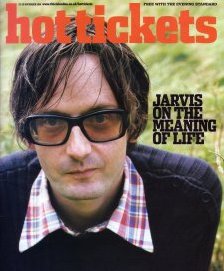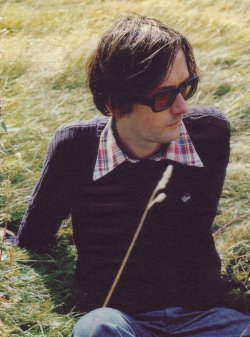 Down To Earth: Jarvis Cocker Interview
Down To Earth: Jarvis Cocker InterviewIn the three years since Pulp's last album, Jarvis Cocker has discovered another side to himself.
The first thing that strikes you about Jarvis Cocker is just how funny and eloquent he is. Even at 11 am on a subdued, rainy autumn morning, he possesses the kind of charisma that has propelled him to being one of this nation's most recognisable musical forces. His blend of working-class cynicism, gritty northern wit and subtle poetry seems as relevant today as it did six years ago, when Pulp were first shoved under the mainstream spotlight with their anthemic breakthrough hit 'Common People'.
Today's Jarvis Cocker is a humbled man - the recent horrific events in New York have put life very much into perspective. "At the moment, like a lot of people I feel powerless. When you realise that you have no power over your own destiny at all, my position counts for f*** all, I can't change anything, I can only try to create work that is honest in some way, but it's just entertainment at the end of the day," he says. "what used to get me up was an alarm clock and then listening to Radio 4, but with the recent events, waking up and hearing all the awful shit that's going on, makes you not wanna get out of bed. Now I just wait for it to get so light that I can't possibly be asleep any more."Twenty-three years since their inception in his home town of Sheffield, Pulp have just released their seventh, and perhaps most important, album to date. In 'We Love Life', Britain's last great indie storytellers have seemingly exorcised many of the demons that scarred their hugely acclaimed but comparatively unsuccessful predecessor, the 1998 disillusionist opus 'This Is Hardcore'. "I think disillusionment is generally considered a negative thing, but as you move through life I think you have to shed illusions, and you find yourself thinking 'That's an illusion, that doesn't mean anything,' therefore you start to look for things that do mean something, and I guess this new record chronicles that search."
Hence the title, 'We Love Life' then? "It was just about going back to basics. If you look at the song titles, you probably think, 'Jesus Christ, this is a record for children or something.' Trees, weeds, birds - sometimes you need to go back to basic things, especially if you've gone up a blind alley. You have to get back to where you started and then take a different road," he adds.
More of a reaction to life in London perhaps? "I'd lived in London for a long time before 'This Is Hardcore'. I've been here ten years now. Living in London has obviously affected my life. But I don't think London is an evil place that gobbles up people's souls and corrupts them. People do that to themselves. London will give you that opportunity to do that more than other cities in the UK, but if you want to f*** yourself up you can do that anywhere. It's really what's going on in your head. I'm trying to be a more spiritual person. I believe in a spiritual dimension to life, otherwise it's just mechanical and horrible. It's a human thing. It doesn't come from outside, it is latent within us - I guess you could call it a soul or something. Some people's souls don't develop. They remain like a withered seed, but you can develop it if you try, and I think it makes you a better person if you do."

So where exactly do Pulp fit into the state of musical affairs in 2001 where Rap and Nu-Metal is king, and recycled Ameri-culture in the form of The Strokes or The White Stripes is considered 'hip'? "I haven't got a f***ing clue to be honest, we could be completely out of step with it as far as I know. You only find out when you actually release something. You have to go with what's going on in your head at that time. I hope this record is more in tune with what people think. I think it might be, because I've been leading a more normal life in the past few years than I had in the years preceding This Is Hardcore." Indeed the three years post-This Is Hardcore have been sobering for Jarvis, not only in coming to terms with his life in the public view, but also dealing with a self-enforced return to normality. These days you are more likely to see him travelling on the Underground or checking out some new talent in one of London's toilet circuit gig venues than crawling out of a showbiz party at 4am with an Oscar-nominated Hollywood starlet, such as former girlfriend Chloe Sevigny, on his arm. His infamous Michael Jackson 'mooning' incident at the 1996 Brit Awards, which cast him into the world of the tabloid popstar, still haunts him like the ghost of Christmas past, but these days he can laugh it off easily and even freely admits to 'really liking some of his songs'.
The process of making We Love Life was long and laborious and involved scrapping an entirely recorded album, and re-recording it under the guiding hand of legendary Sixties producer Scott Walker, whose touch can be richly observed on the psychedelic wonder of 'Sunrise', the strung-out bliss of 'Wickerman' and first single 'The Trees', or on the spectacular throbbing Beatles-tinged opening track 'Weeds'. "He brought his sensibility to it, in that he brought his approach to songs in ways that we hadn't particularly thought of before," Jarvis says. "He gave us room to operate, which was good. He thought about the songs and how to bring the best out of the music. It wasn't like, 'Hey man, let's get a brilliant drum sound' - though he did get good drum sounds. That was a real defining moment - it comes back to what we were saying about illusions. He's a real person, one that had been an influence on my own work. To work with someone who occupies that position - you are dealing with someone as a human being, not an icon. As you get older, you just don't have that unhealthy hero worship."
Aside from making We Love Life, Jarvis and fellow Pulp member Steve Mackey have been busying themselves with their new club venture, Desperate, which made its debut as part of this year's Homelands festival. "It's great. You go to clubs, these over-designed clubs where you feel that you're making the place look untidy by just being there, where they have a policy that everything has to be over 142bpm. Our club's called Desperate because we are. It seems like a desperate thing to be going to clubs at our age. But what are you going to do, stay in and watch the telly? We try and move it from place to place, so that every time you come it's somewhere different. It goes on till five or six in the morning so you can have a laugh. And if you run a club, you get in for free, and also you get free drinks. I leave the door policy to other people, we invite people we know and like. As long as you keep the f***ing meatheads out I'm not bothered. Any race, creed or sexual persuasion. The more mixed the better for me. The music's pretty eclectic."
They have even created special badges that bear the legend 'I'm Desperate'. "We went to see U2 the other day and we tried to give Adam Clayton an 'I'm Desperate' badge and he took it very badly - thought we were trying to take the piss out of him."